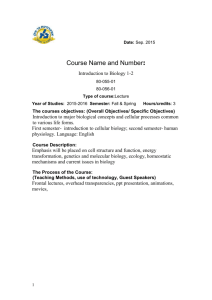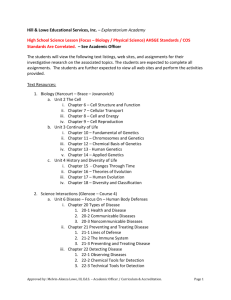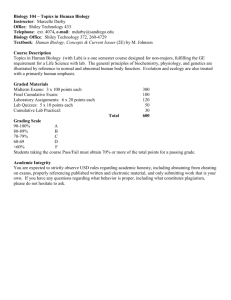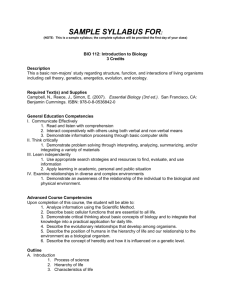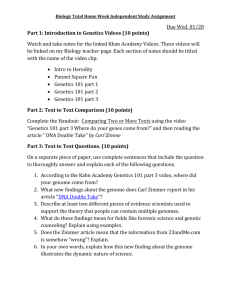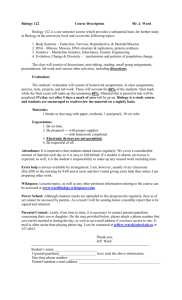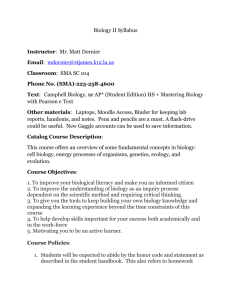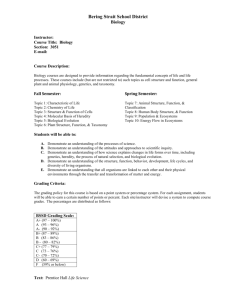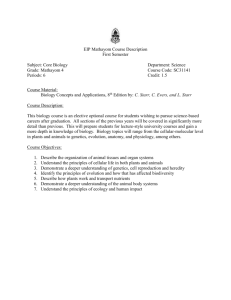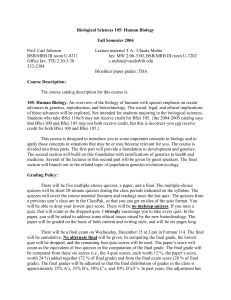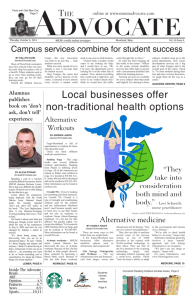Course Outline
advertisement
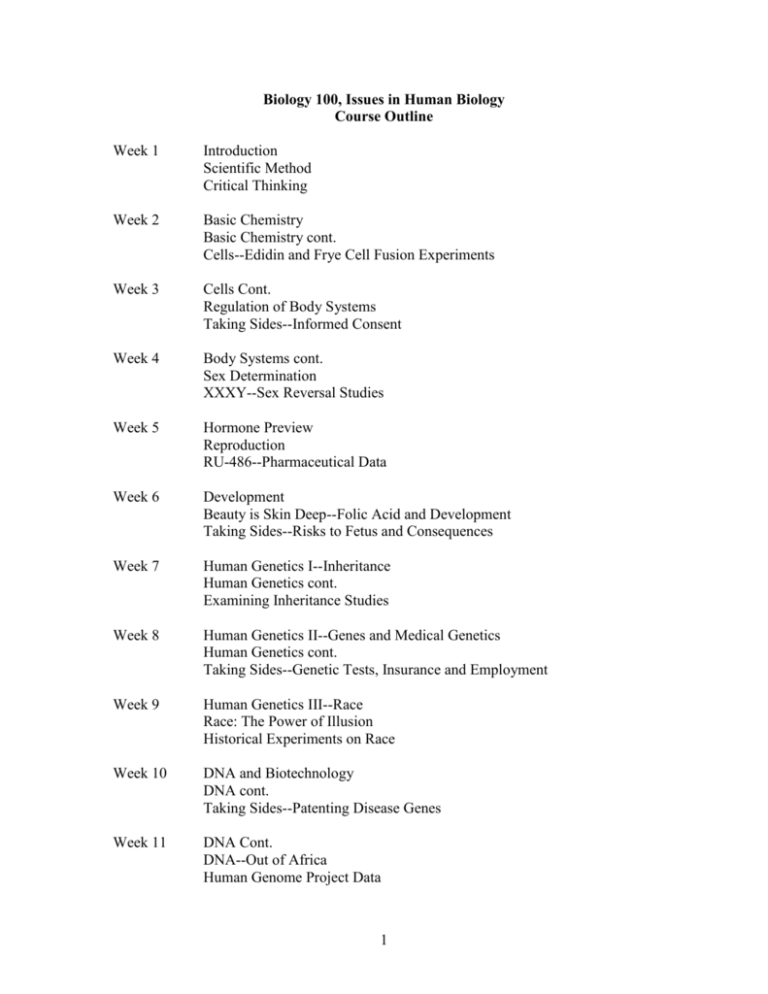
Biology 100, Issues in Human Biology Course Outline Week 1 Introduction Scientific Method Critical Thinking Week 2 Basic Chemistry Basic Chemistry cont. Cells--Edidin and Frye Cell Fusion Experiments Week 3 Cells Cont. Regulation of Body Systems Taking Sides--Informed Consent Week 4 Body Systems cont. Sex Determination XXXY--Sex Reversal Studies Week 5 Hormone Preview Reproduction RU-486--Pharmaceutical Data Week 6 Development Beauty is Skin Deep--Folic Acid and Development Taking Sides--Risks to Fetus and Consequences Week 7 Human Genetics I--Inheritance Human Genetics cont. Examining Inheritance Studies Week 8 Human Genetics II--Genes and Medical Genetics Human Genetics cont. Taking Sides--Genetic Tests, Insurance and Employment Week 9 Human Genetics III--Race Race: The Power of Illusion Historical Experiments on Race Week 10 DNA and Biotechnology DNA cont. Taking Sides--Patenting Disease Genes Week 11 DNA Cont. DNA--Out of Africa Human Genome Project Data 1 Week 12 Defense Against Disease Defense Cont. Vaccination Debate and Data Week 13 Parasites and Pathogens World Diseases Taking Sides--Human Experiments in the Third World Week 14 STDs AIDS Drug Testing and Treatments Week 15 Blood Sickle Cell Anemia Taking Sides--Medicaid and Patient Centered Ethics Week 16 Evolution Human Evolution Evidence for Evolution Instructor: Ellen Brisch, , 477-5940, brisch@mnstate.edu Office hours: Mon, Wed, Fri 8-10 am, Mon Wed 11am-1 pm, or by appointment . Please email to set up an appointment to insure that I will be in my office for your visit. Be sure to get an MSUM email account, I delete any hotmail/yahoo etc. emails as they often carry viruses. *You should feel free to come and talk to me at any point if you are concerned about your performance in this class. * Notes on Course Organization: Texts: Human Biology, 8th Ed, Sylvia S. Mader. The text is excellent; it is well written, full of great illustrations, contains informative “stories on the side”, a thorough glossary and chapter summaries with review questions for each chapter. I will not be requiring specific reading, however it is important for you to read up on material I cover in class. I strongly recommend skimming through the chapter for the day BEFORE you even come to class. This helps you to understand lecture material better the day of lecture. Next, you should read up in more detail after lecture. See: http://www.mhhe.com/maderhuman8 Taking Sides: Clashing Views on Controversial Bioethics. 11th Ed, Carol Levine. We will discuss and debate numerous issues in this text. Handbook on Critical Thinking. We will use this as a vocabulary guide and as a guide for our discussions. 2 Lectures: Lectures will be presented in powerpoint and chalkboard format. Figures presented are directly out of the text--so you will have all the information. Be sure to read ahead and come to class ready to take notes. Description: BIOL 100 Issues in Human Biology (3) Course Objectives and Student Learning Outcomes: Human biology is a wide field that includes human physiology, genetics, medical studies and how humans impact the environment. We are bombarded with information about everything from green tea to intelligent design. Our students will be the scientific resources for their families and peer groups; they need to know how to wade through non-science to get to the facts. This course uses data and “news” to teach students how to properly sift through all this material and logically draw conclusions based on fact. Student learning outcomes will be met by using a scientific approach to help students learn how to evaluate and identify valid information: Critical thinking skills will be infused throughout the material so that students will learn how to rationally evaluate “science” findings that are often misleading or flat out erroneous (examples are the presentation of pharmaceutical results--1% vs. 2% are presented as twice the improvement, diet studies, cancer causing agents etc.) Students will learn how to distinguish between factual information and pure opinion by comparing the actual data from studies and how the material is subsequently presented in the media--this will help students to see that an informed position requires solid logical reasoning and knowledge of the actual scientific data. Students will use the scientific method to distinguish between fact and perceived fact, by examining their own biases and beliefs in the context of a scientific approach (examples are diets, exercise supplements, and evolution). Students will use the scientific method to identify fallacies in race, and to examine how scientists in the past have helped provide opinion rather than fact to support race bias. Students will learn how to examine how findings not always truly objective--by comparing studies funded by drug companies to those funded by public granting agencies--claims are not always accurate. Students will learn to question what they read, what is presented, who did the work and draw logical conclusions for themselves. Students will learn how to deconstruct the race myth by examining current genomic and developmental studies. As a class we will examine how science was used to help construct the race myth and supported systemic racism. Students will also learn how science needs to step up to diffuse unsupported racial and homophobic claims. 3 Attendance Policy: While attendance is not required, it is critical for learning Human Biology. We will be covering a great deal of material very quickly. It is important that you come to class, come prepared and come ready to learn. Please see the MSUM policy on attendance at: http://web.mnstate.edu/sthandbook/POLICY/index.htm Academic Honesty: I believe that cheating does not get you anywhere. It is not fair to either you or to your classmates. To be fair to us all, I will ask you to support and write the following NO CHEATING honor pledge which states: “To be fair to my classmates and myself I have neither given nor received aid on this quiz/exam/paper/reading/presentation.” on each quiz, and exam. Please see the MSUM policy on academic honesty at: http://web.mnstate.edu/sthandbook/POLICY/index.htm Disabilities Services: Students with disabilities who believe they may need an accommodation in this class are encouraged to contact Greg Toutges, Coordinator of Disability Services at 477-5859 (Voice) or 1-800-627-3529 (MRS/TTY), CMU 114 as soon as possible to ensure that accommodations are implemented in a timely fashion. Disclaimer: While I have tried to set up course accountability to be as objective as possible I reserve the right to factor attitude, attendance, and improvement into the final grade. Again; No excused absences or rescheduling on Exam/Quiz day. If you have a conflict or feel a bug coming on, see me ahead of time--Perhaps we can work something out. To be fair to your classmates there is no budging on this one! If you have a serious and legitimate reason to reschedule, I will be open to the possibility of rescheduling while still being fair to your classmates. 4
